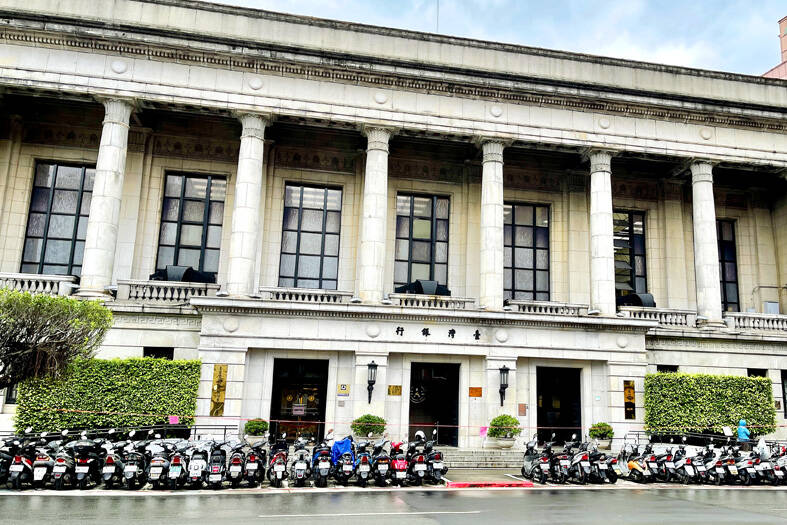Six state-run banks hold NT$4.55 billion (US$148.39 million) in unsecured credit issued to France’s embattled Orpea SA nursing home group, state-owned Bank of Taiwan (臺灣銀行) said on the banks’ behalf late on Tuesday.
Orpea is seeking to restructure 9.5 billion euros (US$10.01 billion) of debt as it seeks to emerge from a scandal over its treatment of nursing home residents and allegations of financial misconduct, Bloomberg reported last month.
Bank of Taiwan said the nursing home group is maintaining normal operations and making regular interest payments.

Photo: George Tsorng, Taipei Times
In addition to Bank of Taiwan, Taiwan Cooperative Bank (合庫銀行), Hua Nan Commercial Bank (華南銀行), First Commercial Bank (第一銀行), Mega International Commercial Bank (兆豐銀行) and Chang Hwa Commercial Bank (彰化銀行) also hold syndicated loans of 142 million euros dating back to 2012, Bank of Taiwan said in a statement.
The state-run banks agreed to lend Orpea money after European peers reached out to their branches in London, Paris and Brussels, it said.
Other domestic commercial banks did not participate because most of them do not have branches in Europe, it added.
The nursing home operator is proposing to convert 3.8 billion euros in unsecured debt to equity, essentially forcing creditors to sell their holdings at steep discounts, and is also seeking to raise as much as 2.1 billion euros of fresh funds, Bloomberg said.
Unsecured debts are common in Europe, especially with companies that enjoy top-grade credit ratings, Bank of Taiwan said, adding that France’s central bank in 2017 assigned Orpea the best credit profile.
Until last year, Orpea’s revenue expanded rapidly following an initial public offering in 2002, as the care home business proves profitable with France’s aging society, it said.
The group’s cash strain has to do with an emerging liquidity crisis amid sharp inflation and monetary tightening, it said.

SEMICONDUCTORS: The firm has already completed one fab, which is to begin mass producing 2-nanomater chips next year, while two others are under construction Taiwan Semiconductor Manufacturing Co (TSMC, 台積電), the world’s largest contract chipmaker, plans to begin construction of its fourth and fifth wafer fabs in Kaohsiung next year, targeting the development of high-end processes. The two facilities — P4 and P5 — are part of TSMC’s production expansion program, which aims to build five fabs in Kaohsiung. TSMC facility division vice president Arthur Chuang (莊子壽) on Thursday said that the five facilities are expected to create 8,000 jobs. To respond to the fast-changing global semiconductor industry and escalating international competition, TSMC said it has to keep growing by expanding its production footprints. The P4 and P5

DOWNFALL: The Singapore-based oil magnate Lim Oon Kuin was accused of hiding US$800 million in losses and leaving 20 banks with substantial liabilities Former tycoon Lim Oon Kuin (林恩強) has been declared bankrupt in Singapore, following the collapse of his oil trading empire. The name of the founder of Hin Leong Trading Pte Ltd (興隆貿易) and his children Lim Huey Ching (林慧清) and Lim Chee Meng (林志朋) were listed as having been issued a bankruptcy order on Dec. 19, the government gazette showed. The younger Lims were directors at the company. Leow Quek Shiong and Seah Roh Lin of BDO Advisory Pte Ltd are the trustees, according to the gazette. At its peak, Hin Leong traded a range of oil products, made lubricants and operated loading

The growing popularity of Chinese sport utility vehicles and pickup trucks has shaken up Mexico’s luxury car market, hitting sales of traditionally dominant brands such as Mercedes-Benz and BMW. Mexicans are increasingly switching from traditionally dominant sedans to Chinese vehicles due to a combination of comfort, technology and price, industry experts say. It is no small feat in a country home to factories of foreign brands such as Audi and BMW, and where until a few years ago imported Chinese cars were stigmatized, as in other parts of the world. The high-end segment of the market registered a sales drop

Citigroup Inc and Bank of America Corp said they are leaving a global climate-banking group, becoming the latest Wall Street lenders to exit the coalition in the past month. In a statement, Citigroup said while it remains committed to achieving net zero emissions, it is exiting the Net-Zero Banking Alliance (NZBA). Bank of America said separately on Tuesday that it is also leaving NZBA, adding that it would continue to work with clients on reducing greenhouse gas emissions. The banks’ departure from NZBA follows Goldman Sachs Group Inc and Wells Fargo & Co. The largest US financial institutions are under increasing pressure